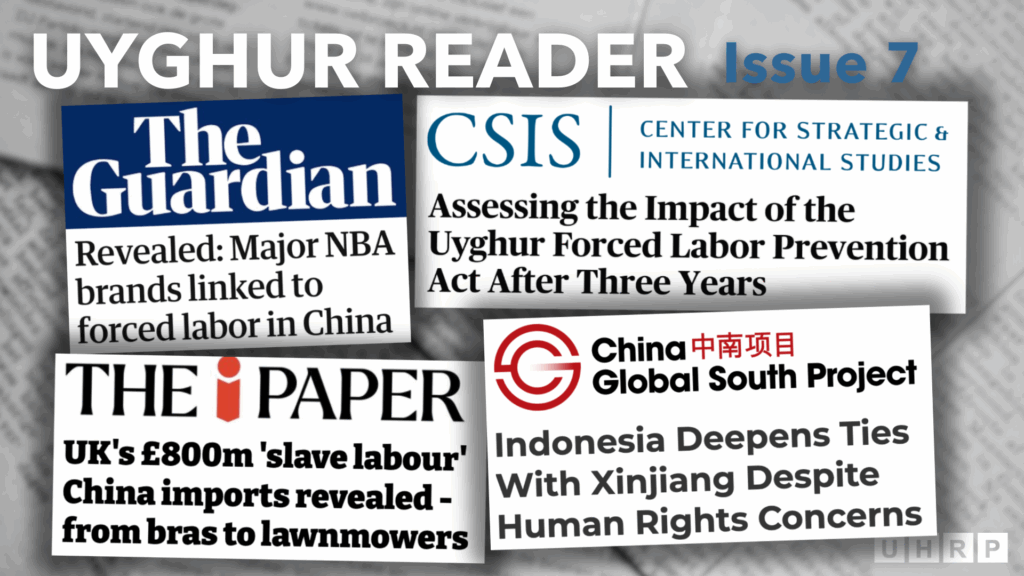The Uyghur Reader: Stories We’re Following (Issue 7)

Issue 7: August 21 – September 3, 2025
Welcome to the seventh issue of The Uyghur Reader, a biweekly content roundup curated by the staff of the Uyghur Human Rights Project.
Each issue features carefully selected articles, reports, and publications from media outlets, academic institutions, NGOs, and government sources. While we highlight urgent human rights issues, we also aim to reflect the breadth of the Uyghur experience, including politics, economics, history, and culture.
This week’s selections come from Director of Research Henryk Szadziewski, Associate Director for Research and Advocacy Peter Irwin, and Chinese Outreach Coordinator Zubayra Shamseden.
📌 In an analysis for the Center for Strategic and International Studies, Laura T. Murphy and Charlotte Tate focus on the efficacy of the Uyghur Forced Labor Prevention Act (UFLPA) since it was passed in December 2021. The authors argue the UFLPA has exposed Chinese state repression, and some companies have responded by disentangling themselves from the Uyghur Region. Nevertheless, data on conditions for Uyghur workers remains scarce and opaque. Despite enforcement, over three million forced transfers still occurred in 2023, and the Act could even be inadvertently pushing the Chinese government to double down on labor transfers. Until supply chain bans become global, and not just a U.S. measure, change will remain out of reach. “Assessing the Impact of the Uyghur Forced Labor Prevention Act After Three Years,” August 29.
📌 Diego Ge interviews Eli Friedman, Professor of Global Labor and Work at Cornell University, who warns that while the U.S. rightly names atrocity crimes targeting Uyghurs, Washington uses the genocide label as a geopolitical tool, applying no such standard to allied states. The Uyghur Forced Labor Prevention Act is necessary, he says, but risks hypocrisy if supply chains simply shift to countries with their own forced labor practices. For true solidarity, states must oppose repression consistently, not selectively for strategic advantage. “Neither Washington Nor Beijing w/ Eli Friedman (Part 1),” The U.S.-China Perception Monitor, Carter Center, August 26.
📌 Emily Baker-White writes in Forbes about human rights risks after the U.S. government took a 10% stake in Intel. Intel maintains partnerships with Chinese surveillance companies like Uniview, Hikvision, and Cloudwalk that are all sanctioned for the repression of Uyghurs and other Turkic peoples. Intel’s technology has been integrated into surveillance systems accused of “ethnicity detection,” raising concerns about complicity in human rights abuses. This contradiction exposes the dangers of U.S. investment in a company entangled with authoritarian surveillance infrastructures targeting Uyghurs. “Intel Worked With Chinese Firms Sanctioned For Enabling Human Rights Abuses,” August 26.
📌 On August 25, Rob Hastings at the i Paper uncovers how the UK imported over £800 million worth of products from the Uyghur Region in the past year, ranging from bras and t-shirts to lawnmowers and walnuts. These imports come despite evidence that Uyghurs are subjected to state-sponsored forced labor. Rahima Mahmut, executive director of Stop Uyghur Genocide, called the findings a “national disgrace.” “UK’s £800m ‘slave labour’ China imports revealed – from bras to lawnmowers.”
📌 Human Rights in China spotlights the case of Feng Siyu, a brilliant young scholar from Zhejiang, who dedicated herself to Uyghur cultural studies, becoming fluent in the Uyghur language and conducting fieldwork in the Uyghur Region. In 2018 she was arrested on fabricated charges after collaborating with renowned and imprisoned ethnographer Rahile Dawut. Feng is believed to have been sentenced to 15 years in prison. Her case exemplifies the Chinese government’s fear of scholarship on Uyghur culture and memory, and those who seek to preserve it. “Young Chinese Scholar Missing Since 2018 After Conducting Research on Uyghur Culture,” August 22. Read in Chinese/中文.
📌 Muhammad Zulfikar Rakhmat and Yeta Purnama argue in an August 21 commentary piece for China Global South Project that Indonesia’s growing trade and educational partnerships with the Uyghur Region, including deals with the U.S.-sanctioned Xinjiang Production and Construction Corps (XPCC), risk legitimizing Beijing’s attempts to rebrand the region internationally. While Indonesian and Chinese officials framed the cooperation as grounded in shared Islamic traditions and “mutual respect,” the authors warn that such agreements obscure ongoing repression of Uyghurs and raise questions about Jakarta’s willingness to prioritize economic growth over human rights. “Indonesia Deepens Ties With Xinjiang Despite Human Rights Concerns.”
📌 An Institute for the Study of War report by Karolina Hird, Daniel Shats, Kelly Campa, and Frederick W. Kagan, published on August 20, shows that the Xinjiang Production and Construction Corps has extended its reach into Tatarstan and “may be setting conditions to become more involved in the Russian defense industrial base, including potentially by providing forced Uyghur labor to Russian defense production efforts.” While on August 30, in an article co-published by The Guardian and The Bureau of Investigative Journalism, Daniel Murphy reveals how major NBA-linked brands Li-Ning, Anta, 361 Degrees, and Nike are tied to factories using forced Uyghur labor.
Keep reading:
- Gianluca Costantini, Channeldraw, August 21: Voices Under Siege: The Struggle of Uyghur Writers and Poets in Xinjiang
- Amnesty International, August 28: China: Still no accountability for crimes against humanity in Xinjiang, three years after major UN report
- Shohret Hoshur, Bitter Winter, August 21: Farewell to Radio Free Asia—Not to the Uyghur Cause
- The Center for Uyghur Studies, August 20: Exposing China’s Propaganda Campaigns in MENA
- Arslan Hidayat and Nuriman Abdureshid, Kashgar Times, August 28: For Uyghurs, A Passport Is Not Just A Passport
- Carlos Aguilar, Variety, August 30: ‘Preparation for the Next Life’ Review: A Bittersweet Immigrant Love Story Thrives on Two Terrific Performances
- Magnus Fiskesjö, MCLC Resource Center, Ohio State University, August 23: Hong Kong forum on Xinjiang relays Chinese state propaganda
- Ben Doherty, The Guardian, August 23: Kmart supply chains under scrutiny for potential Uyghur forced labour links in Australian court case
